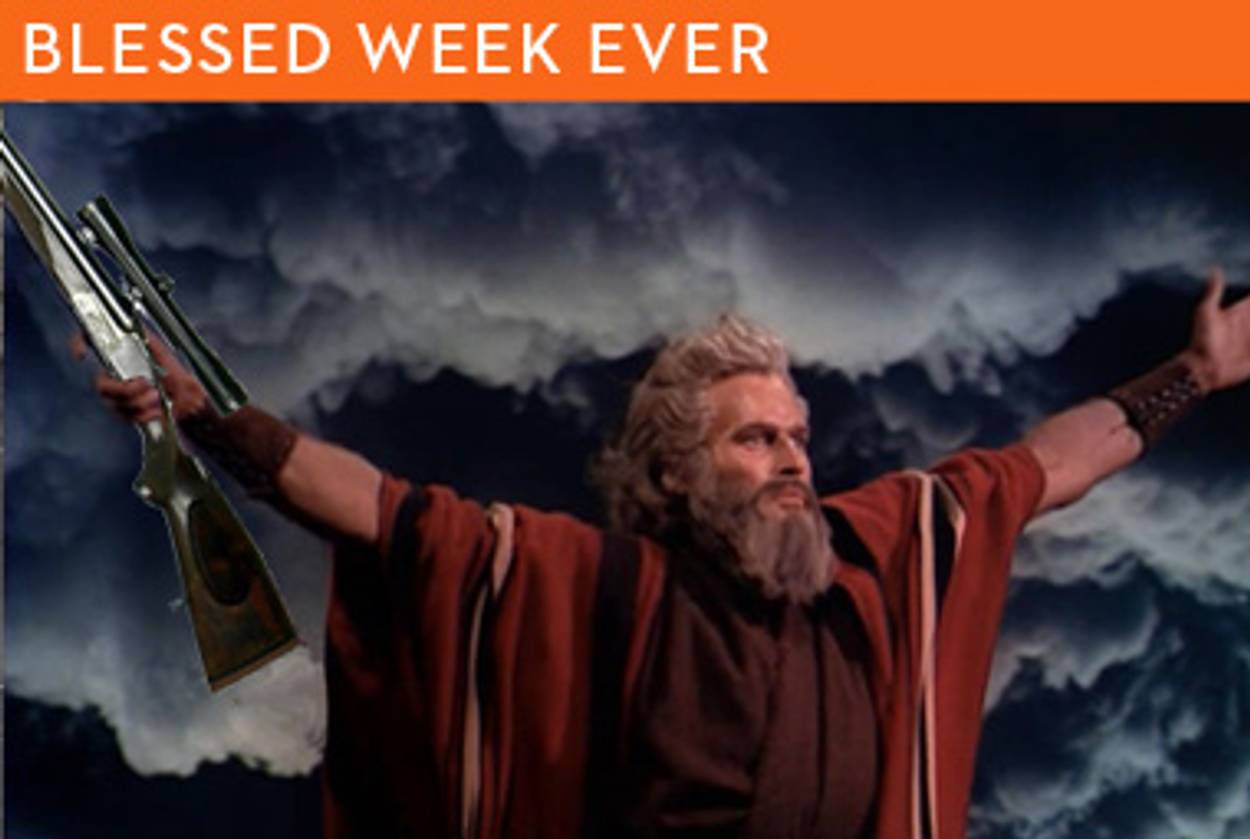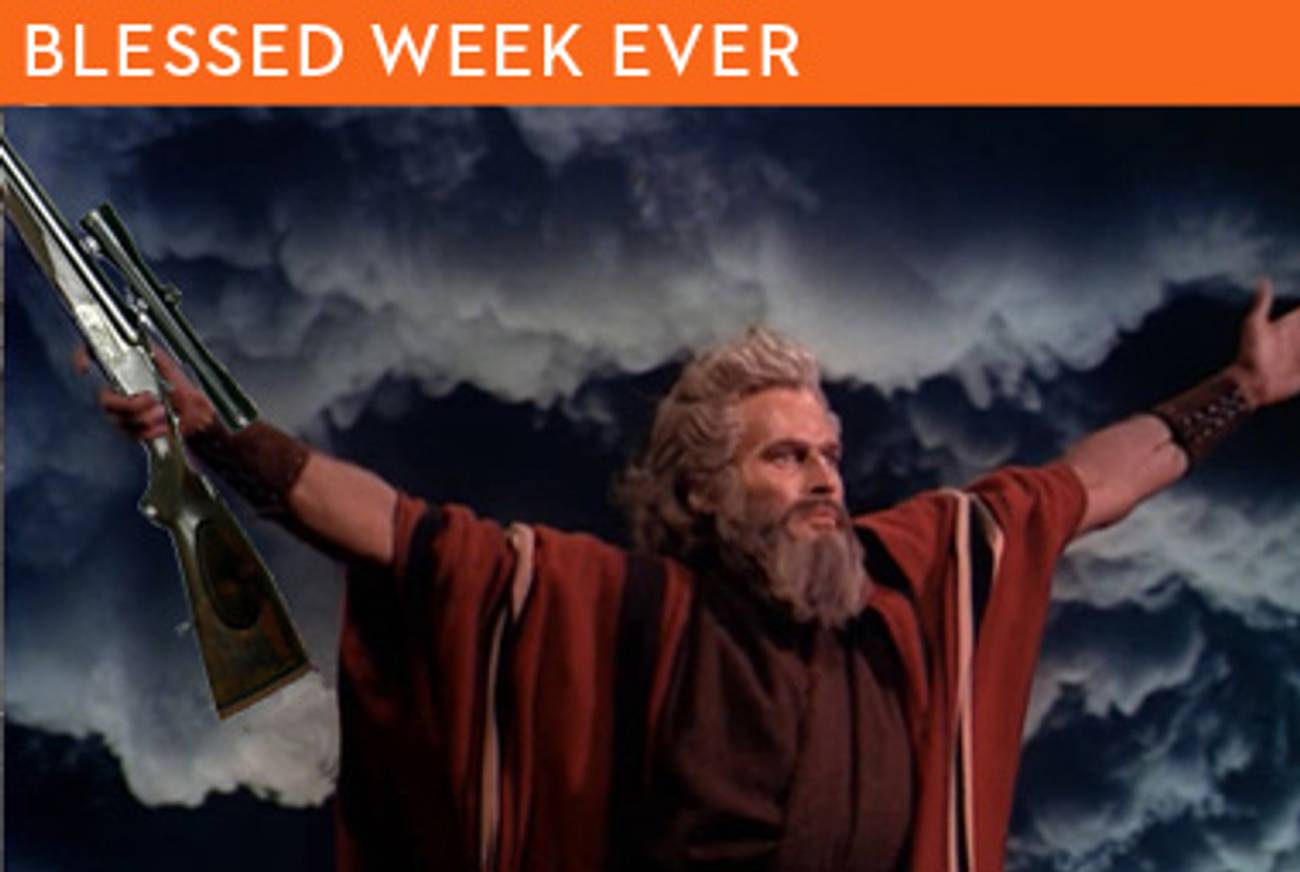High Noon
If Jews want to influence the public conversation, they must heed the lesson of this week’s parasha—the one about an eye for an eye and a tooth for a tooth.




As they read this week’s Torah portion, Jews the world over are likely to come across a particularly harsh lesson in divine reasoning. Instructing Moses about the eternal laws he’s to deliver to the Israelites, God commands a fearful symmetry between punishment and crime. The words he uses have become famous: “an eye for an eye,” the Lord insists, “a tooth for a tooth.”
Few biblical quotes, arguably, have been more maligned. Confronted with this wrathful standard in the film version of Fiddler on the Roof, Tevye winces. “Very good,” he says. “That way the whole world will be blind and toothless.” Similarly worded rejections are attributed to Martin Luther King Jr. and Mahatma Gandhi.
It’s not hard to see why: All that eye poking and tooth pulling feels a tad primeval for us enlightened folk. We prefer to talk about cooperation and collaboration and compassion. And, for the most part, we’re the better for it. When we read biblical bits like this week’s abundance of laws, it’s tempting to ignore the lot of them; after all, how many of us have to worry about our bull goring a neighbor, a loved one becoming a sorceress, or other ancient concerns that have little to do with our modern lives?
But the ancient laws are more relevant to us than we imagine. If we observe their spirit rather than their letter, we stand to uncover an array of astonishingly progressive legislation: protecting the rights of animals and servants, defending the well being of women, and taking other measures to ensure a just and robust society. There’s grace here, and love and kindness, but all these come at a cost: Break the rules, we’re told, take advantage, and you’d better watch out for those eyes and teeth.
There’s much evidence to suggest that we could use such a shot of harshness. Everywhere, from American classrooms to American Idol, we see the culture of entitlement: Whether they can actually sing or dance or do math, Americans are certain that they can, ignoring signs to the contrary. In boardrooms and newsrooms and just about anywhere else, delusional souls seek fortune and fame, break the rules, and, all too often, get away with it. In both Wikileaks and the Tea Party, we see the hissing sort of disdain for authority that, at its most extreme, can result in fatalities. An eye for an eye is the antidote to all that; an eye for an eye reminds us, in the bluntest terms imaginable, that we are masters of our own fates, that our actions have consequences, and that rather than hiding in the thicket of excuses and justifications that is so much of our public discourse today we should take responsibility for our decisions and prepare to be judged for our deeds.
All this talk, I realize, sounds ominous. It is also terribly abstract. I have, then, a concrete proposal. American Jews today, I believe, should raise their voice for responsibility and accountability, a sorely needed moral move. And the best way to do this is to bear arms.
I am well aware that the previous sentence may sound—comment vous dites?—crazy. Allow me a few qualifications: I don’t think that Jews should own guns because they face clear, present, and particular dangers as citizens of the United States. Nor do I believe that Jews should turn to guns instead of putting their trust, as everybody else does, in the criminal justice system, nor that the solution to our tortured body politic, God forbid, lies in some sort of proactive paramilitary action. What I do mean is that American Jews—a group whose cosmology of saints includes those famous for opposing power (Abraham Joshua Heschel, Elie Wiesel), those who mock power (Lenny Bruce, Jon Stewart), and those who’ve turned power into a harmless farce (Norman Mailer)—could use some locks, stocks, and barrels if they are to offer American society a vision as relevant to our times as those of Heschel and the other Jewish luminaries of the civil rights movement were to the 1950s and 1960s.
A personal anecdote might illustrate the point. I remember being 6 or 7 years old in Israel, playing with a toy gun, pointing it at my father and pretending to shoot. He looked at me, unsmiling. “Never,” he told me, his voice cold, “point a gun at something you don’t intend to kill.” My mind was reeling. I was just a boy, and it was just a game, but my innocuous play had been pierced by a sudden sense of reality, and I wasn’t sure what had happened.
A year later, when I shot my first real rifle, I understood. The kickback didn’t bother me much; what captivated me was the steely realization that the tool I now held in my hands gave me the power to take someone’s life, and that with such power—to quote my favorite political philosopher, Spider-Man’s uncle—came great responsibility. If I had the agency to kill, I thought, then I also had the agency to soothe and help and comfort. With my finger on the ultimate generator of consequences, I realized that I had the power to shape things, for better or for worse.
A few weeks ago, in Tuscon, another young man experienced a similar sentiment. Like me, he was a gun enthusiast, and if news reports about Jared Lee Loughner are to be believed, he, too, had given much thought to the strange tickling of omnipotence that comes with gun ownership. But unlike me, Loughner allegedly chose murder. Precisely why we may never know, but one possible reflection has to do with his creeping sense of powerlessness, an impotence that drove him to misunderstand Nietzsche and retreat into dreams and squeeze the trigger outside that Safeway on a Saturday morning. He’d spoken about his feelings of powerlessness in the YouTube videos and MySpace updates he left behind. Like so many Americans—supporters of Sarah Palin, fans of Julian Assange, contestants on televised talent shows—he was flummoxed by what he felt was the undue influence of menacing and shady elites. And rather than learn how to feel empowered, he grabbed a Glock and shot.
To many, the lesson to implement involves limiting access to firearms. This, I suspect, includes most of the American Jewish community, whose leading institutions all feature prominently on the National Rifle Association’s list of national organizations with anti-gun policies. But there is a different, far better answer: Rather than take away our guns—as an enthusiastic member of the NRA, I have a lot to say about the various perils of such a proposition—teach us how to handle them with care.
Imagine, then, instructors at summer camps or Hebrew schools or day schools ending their talks about Maimonides or tikkun olam by taking out a .22, passing it around the room, and asking each student to take a moment and reflect on the Talmudic edict that he who destroys a soul destroys the entire world while he who saves a life saves a world entire. With a .22 in hand, the saying becomes much more than a platitude; it becomes a way of life, a way of life devoted to contemplating the freedom we each have to act and the tragedy of choosing destruction over redemption.
This, I believe, is what empowerment is all about. It’s also what eye for an eye means: not wanton violence and blind vengeance, but a deep sense of responsibility that understands just how transient life is and just how careful we must be to preserve it.
Taking away, restricting, or limiting access to guns enforces the same logic of powerlessness at the heart of so many of our contemporary woes. I hope the Jewish community, so attuned to moral crises, might help change the acrimonious discussion about guns by making them a touchstone of personal responsibility rather than a banner of destruction.
Liel Leibovitz is a senior writer for Tablet Magazine and a host of the Unorthodox podcast.
Liel Leibovitz is editor-at-large for Tablet Magazine and a host of its weekly culture podcast Unorthodox and daily Talmud podcast Take One. He is the editor of Zionism: The Tablet Guide.